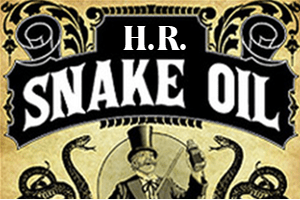In the October 29, 2019 Ask The Headhunter Newsletter an executive is concerned about the role of the job description in employee attrition.
Question
I’m president of a $20 million company, privately owned. Due to unusual turnover, I met with my head of HR and the affected managers. They said the “talent pool” isn’t good any more. HR’s exit notes indicated poor performance and lack of skills as the reasons for termination. So why did you hire them, I asked. They were the best candidates, they said. Then I read the job descriptions they used. Lists as long as a 3 iron. Nine or 10 “tasks,” even more “qualifications required,” and then a stack of “we prefer that you haves.” I asked them, is there something wrong with our process? Are we asking for too much and not training new hires enough? What are your thoughts about a problem like this? It’s serious.
Nick’s Reply
Job descriptions? Here’s what I think of job descriptions and people that write them (with apologies to Monty Python):
That’s almost never the case. I believe that’s a big reason why new hires fail. So, how can you hire for the changing nature of the work?
The job description
When a manager needs work done, HR uses a process that starts with the manager describing the requirements of the job. This conventionally includes the tasks, a list of necessary qualifications, and some flowery promises about the company environment.
HR adds whatever it believes will attract the best and most applicants. Too often, HR’s largesse exceeds the limits of reality. For example, a job for a programmer will require “at least 5 years’ experience” with a scripting language that was invented only two years ago. HR always figures more is better — but doesn’t bother to check with the manager. Or, a go-fer job in the marketing department is characterized as “Senior Marketing Staff,” because it should attract really talented go-fers.
What happens after the job description
Even if the job description is truthful and accurate, almost every job runs head-long into a wall. Six months into it, the new hire is not doing what they were hired to do, but different work and usually more work. That’s because most jobs evolve to fill the ever-changing needs of a business.
The problem is, employers don’t hire for changing needs. HR takes a blurry (and wishful) snapshot of “a job,” fixed in time and in someone’s imagination, larding it with enough “requirements” to make a purple squirrel gag. (There are other ways HR goes off the rails with its hiring methods. See Why does HR waste time, money and the best job candidates?)
Deliverables
Can a “job description” ever be a useful tool in recruiting and hiring? As a headhunter, I’ve always read job descriptions once, then tossed them aside. I call the manager and find out what kind of evolving work the manager really needs done over the next year or two.
Here’s what I ask about:
What’s the problem? What do you want your new hire to make, fix or improve?
What’s the deliverable? What should the new hire deliver to the person working downstream from them? For example, a design engineer needs to deliver a certain part of a subsystem design to the system designer or project manager. What does that part of the subsystem look like and what must it do?
What’s the schedule? What do you need the new hire to deliver or accomplish in the first week, month, three months, six and 12 months on the job? Be specific. The deliverables must be defined in objective terms everyone agrees on. They must be measurable in amount, degree and quality — what are the metrics?
How does the work fit? Finally, and perhaps most important, how will the new hire fit into the larger work flow and objectives of the team, the department and the entire company? This is key, because it suggests what else the new hire must be able to do or learn to do.
Please note that your HR people are in no position to ask these questions and to discuss the details that underpin them. Your managers must do it. While a good headhunter can help them, you don’t need a headhunter if you get on top of this yourself.
Are you doing what you were hired for?
There’s a thing I do when I speak to seasoned managers in executive MBA programs at Wharton, UCLA, Northwestern and other business schools. I ask for a show of hands:
“Who has a job where what you were doing six months into it matched the job description you interviewed for?”
Of course, I get a lot of hoots and LMAOs. No one has ever asserted they were doing what they were hired for to start with.
What to ask job applicants
I suggest you direct your managers to answer the questions above about every job they think they need to fill. My guess is they will find that some jobs have no justification or value. I think they will find that the work that needs to be done is best defined in terms of deliverables that continue to change.
Three good questions for job applicants might be:
- Can you please show us how you would deliver X, Y and Z in three months, six months and 12 months?
- How would you help these 3 other teams deliver their objectives?
- How would you help the company achieve goals A, B and C?
I won’t even get into discussing your company’s plans for new projects, products or services — but your managers need to assess whether job candidates can shift gears quickly to meet the company’s changing needs. One good way to do this is to have applicants spend time with your teams before you hire them, so everyone can see how everyone else thinks and works. (But don’t go here: I think they expect me to work for free.) Of course, it’s your responsibility (and your managers’) to show applicants how you teach employees to do new kinds of work.
Please forget about filling jobs. Think about hiring people who can do changing work and deliver specific outcomes, and who can intelligently discuss how they might contribute to your company’s specific objectives.
There’s not a job description in this mix.
Does the work you do today match the job description you were hired for? How should employers assess job applicants to maximize success for everyone? What’s the most effective way you’ve assessed or been assessed for a job?
: :








 What are you afraid of when job hunting?
What are you afraid of when job hunting?


 I am planning to quit my job, but my boss said to hold off on quitting until we can at least hire my replacement. Otherwise, he said, “I will make things very, very bad for you.” How should I respond to this?
I am planning to quit my job, but my boss said to hold off on quitting until we can at least hire my replacement. Otherwise, he said, “I will make things very, very bad for you.” How should I respond to this?

